Meth, Vanilla and ‘Gulags’: How China Has Overtaken the South Pacific One Island at a Time
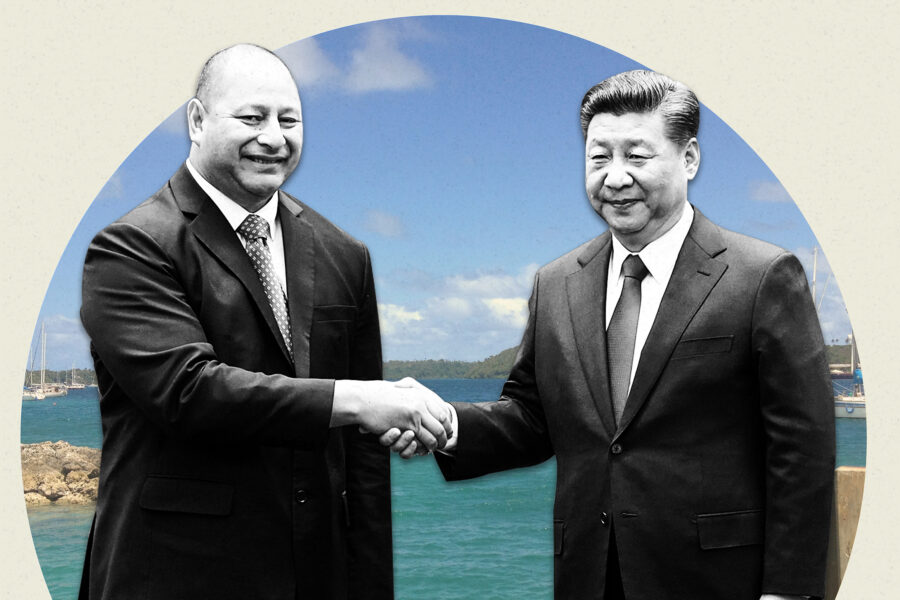
NUKU’ALOFA, Tonga—August 2016 was a sun-swamped winter in the South Pacific and the vanilla business was bad.
A brutal drought had wasted the annual crop and machete-wielding farmers guarded what was left of their vines. A kilo of cured vanilla—those shiny, black pods you find in vials on grocery spice aisles—that I would have paid $50 for two years earlier had soared to $300. The “black gold” story buzzed in the cafes and the villages of the remote island kingdom. If the price collapsed I’d be in trouble. Instead, it just kept soaring, making me paranoid about people thieving.
But while I obsessed over that deep into the night, I almost missed a bigger story that had been growing in broad daylight: the largest building project that Tonga had ever seen.
One Saturday, at a barbecue on the lagoon, the host asked me why I didn’t try to report a piece for some magazine back home about what he called “the Chinese gulag.”
“What gulag?” I said.
“The construction crew,” he said: the men in blue jumpsuits from China. Their barracks were straight out of a Russian novel, he said, puffing on a cigarette. Didn’t I know I was living smack in the middle of a huge story?
Of course, I’d noticed the workers. Who hadn’t? Every day they hurtled down the waterfront road, piled in the bed of white Ute trucks. They were bound for the capital’s central business district where they were building a colossal edifice to house the Tongan government’s premier and all its ministers. The project had been a dream of the Kingdom’s late monarch George V, but the $11 million price of the St. George Palace, as it would be dubbed, was not coming out of the Kingdom’s coffers. Instead, it was being funded—and constructed—entirely by Beijing. It was a tiny fraction of the estimated $5 billion China spent on international aid that year, but it equaled 2.6 percent of Tonga’s GDP.
Still, I hadn’t really stopped to ponder why Chinese workers—and not the many underemployed Tongans—would be doing this work or why the tiny government needed such a massive building. It just seemed like another sign of “development,” the kind of modernity which eventually reaches even tiny islands in the middle of a vast ocean.
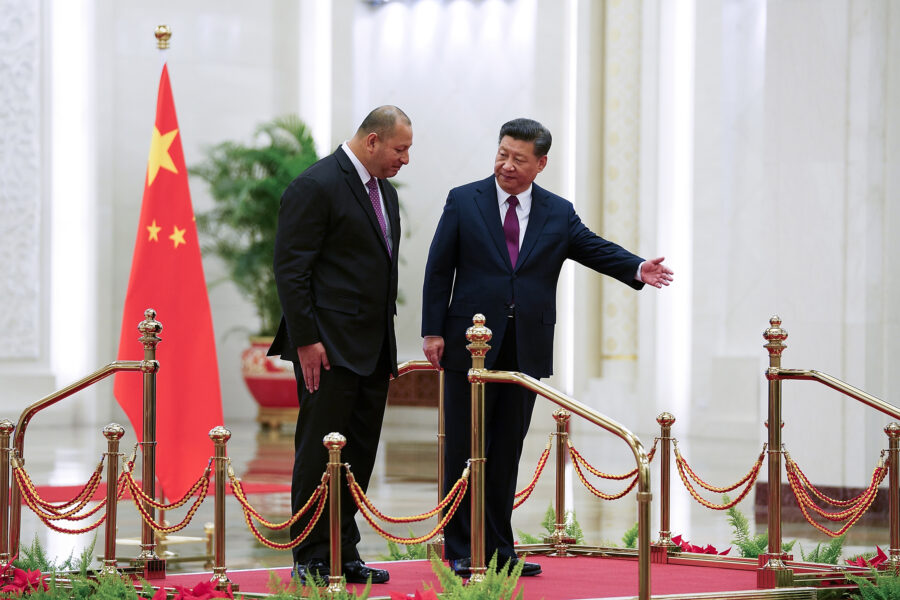
In 2016, on the handful of settled islands in Tongan archipelago, those signs were everywhere: New cars jammed the roads, sand miners were stealing the island’s beaches and New Zealand loggers hauled giant trees by boat from the Kingdom’s last rain-forested island. Methamphetamine wasn’t just passing through Tonga, once a backwater transit hub for drugs en route to Australia and New Zealand, it was burrowed in. Youngsters were using it and crime was rising.
But underneath it all, the growing presence of the Chinese government in Tonga pumped tension into the life of the island nation that anyone could feel. This tension had started long before I arrived in 2014, the year the Chinese Communist Party’s brand-new leader Xi Jinping announced his “Asia-Pacific Dream” of cooperation and launched a tour of the South Pacific countries where he met with Tonga’s soon-to-be-crowned King George VI. Xi came to power in 2013, when Tonga signed the deal with Beijing for construction of the St. George Palace that the men in the blue jumpsuits were now building.
Chinese immigrants ran 80 percent of the shops, draining Tongan money back to China and pumping cheap exports through the islands. In 2006, pro-democracy riots tried to stoke local anger at Chinese and Chinese businesses, and yet in their wake, Beijing paid to rebuild and immigration had resumed.
My barbecue host was Australian. I’m American. We were both Western guests in Tonga, and maybe we didn’t have a right to feel nervy about China being on the move there. Nonetheless, we apparently both did. The importation of a big labor gang to build a government palace felt like a symbol of an empire on the move and maybe I was missing a complete global shift. So after I shipped out my meager partial ton of vanilla and could relax a little, a Tongan friend and I went to investigate the gulag on a sunny weekday afternoon.
The barracks sat in plain view: simple, spare and clean.
A thin wall wrapped around a courtyard. There were tables for eating and sinks for washing up. A long line of doors opened into human-sized cabinets, shelved with beds for the men to sleep in. A couple of men stopped washing dishes at the courtyard sinks and, hearing my English, called someone else to show us around. The new guide was friendly but confused about why I wanted to see the camp. He didn’t like personal questions about himself, saying only that he traveled the world to work on projects for his government. He said nothing about his bosses. I looked them up later. Beijing had contracted one of China’s state-owned conglomerates, the Shanghai Construction Company, to build the palace.
There was nothing wrong with the camp. There was nothing right about it either, with its cramped quarters and its separateness from the rest of the island life. It looked more like a jail than Tonga’s actual prison, which sat on a few lush acres with bungalows for the prisoners and a van to take them on unshackled trips into town. You never saw the Chinese workmen roaming free anywhere. We wondered if they even got to visit the Chinese brothel on the other side of town. We wondered if they got to do much other than labor. They seemed to work like no one else on the island—six days a week, I guessed, with Sundays off because Tongan law ordered it so.
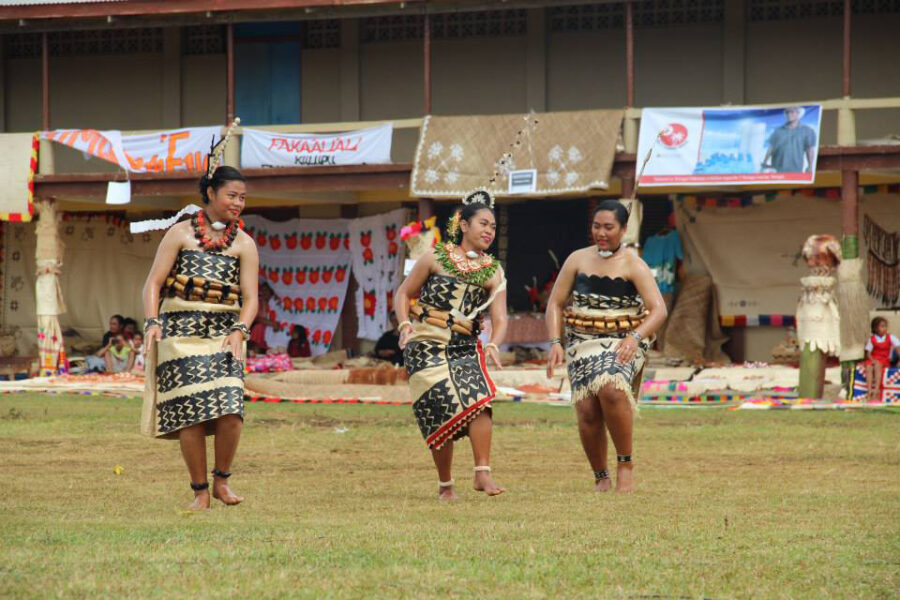
It’s the “gulag” that I’ve often thought about in the nearly five years since I left Tonga. Whenever I read another story about Beijing’s globe-spanning Belt-and-Road Initiative, I think of the blue-jumpsuited men. And the headlines about China in the South Pacific just get more frequent. Only recently, China was trying to buy the region’s dominant telecom company, scaring Australia into bidding for it, too.
Tonga’s chain of nearly 170 tiny islands, most of them uninhabited, doesn’t look like much to the average outsider and that’s why it’s such a perfect example of Beijing’s strategy.
No country is too small, and no small country’s affairs too trivial for China to concern itself with in its march for new global order, a “community of common destiny”—defined by cooperation with Beijing. At the same time, Tonga, even among the scattered island nations of the Pacific, also stands out symbolically. Tonga was the only nation in the region that escaped colonization by the West, and its status as one of the world’s last monarchies affords it special recognition. In 2015, one of the Hapsburgs of Europe attended King George VI’s coronation, as did Japan’s then-crown prince and princess who are now emperor and empress. The U.K. even touts the Tongan royals’ ties to the House of Windsor.
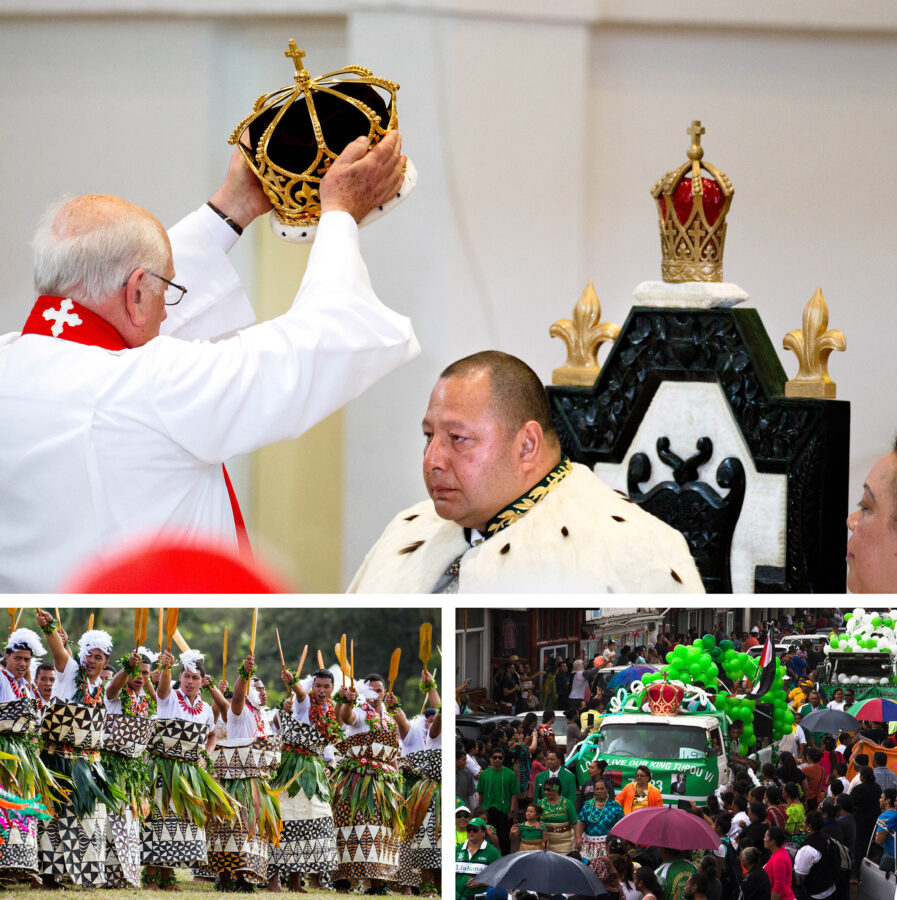
People who study the region understand the consequences of this miniature drama.
“For me, if Tonga falls to China, then that’s an indication that the Pacific is gone,” Cleo Paskal, a lead researcher on the Indo-Pacific for the London-based international think tank Chatham House, told me recently.
The Pacific being “gone” could mean a lot of things in a region whose islands most Americans can’t find on a map: Chinese control of the ocean and its fishing industries, for one thing. But also authority over a sphere that’s greater in size than every country of the world combined — and that the U.S. and its allies have long assumed would stay in their corner through the anchors of New Zealand and Australia.
When I left Tonga in 2016, the price of vanilla was on its way to $750 a kilo and the government palace was maybe half-done. Since then, the “Chinese gulag” has morphed in my memory into the blue-uniformed emblem of Beijing’s projects that move huge amounts of money and people whenever and wherever the Communist Party wants, to build and buy whatever it wants.
Looking back, I feel like I watched a coup without seeing anyone toppled, a slow-motion global regime change without tanks and bombs. And I don’t know what could possibly reverse it now.
My grandfather traveled the world for vanilla and ended up in the Kingdom in the 1970s. Its crop was as beautiful and fragrant as the vanilla in Madagascar where he had been locked out by a government cartel. He’d seen a lot of places, but he made Tonga sound particularly special—a generous place, a storybook kingdom. If you were hungry, you could drink a coconut or pick a fruit or catch a fish. I found carbon-copies of the typewritten letters he’d sent to a French botanist who spent his career in the tropics to perfect the art of vanilla curing. To him, my grandpa described the gentle life in Tonga in a poignant way.
So in 2014, after a stint in San Francisco that burned me out and left me broke, I jumped at the offer from my aunt to head to the islands on behalf of the family business. I landed on the main island of Tongatapu, becoming another of the Western palangi who’d also found their way there. Palangi is the umbrella term for everyone from Peace Corps and foreign aid workers, diplomats, speculators, contractors, yachters, hoteliers and drifters.
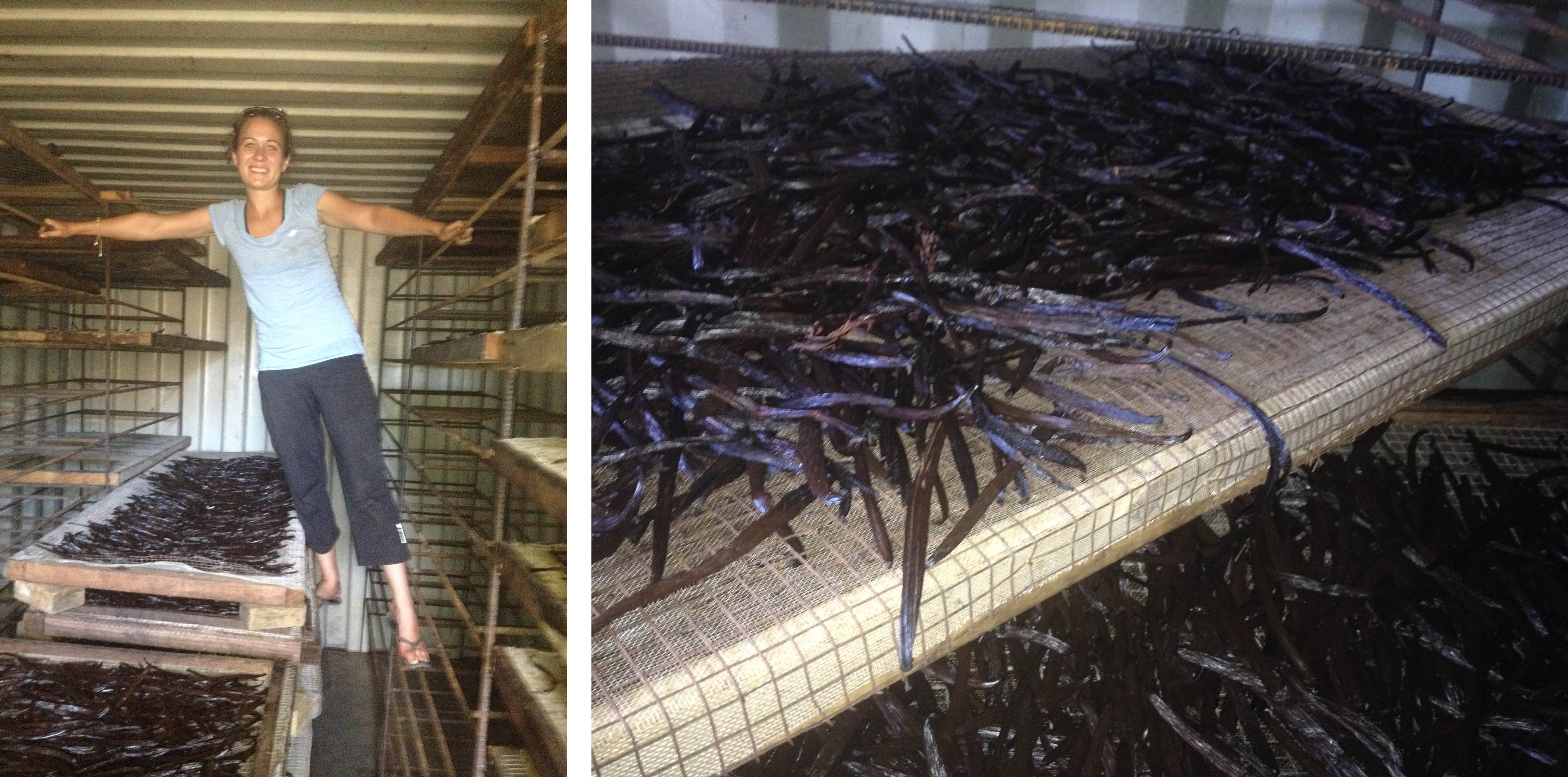
About a third of Tongatapu’s 75,000 islanders live in Nuku’alofa, the capital whose name translates as “Abode of Love.” Some think calling it a town is generous. It’s just a tiny grid of a few sun-dazed streets with cafes and markets and banks. The main landmark before Beijing embarked on the gaudy new government complex was the Royal Palace, a red-and-white Victorian gingerbread mansion. Thirty years ago, Nuku’alofa disappointed the writer Paul Theroux, who described it as “dusty and down-at-heel.” And that was before the 2006 riots burned down most of its buildings.
I loved it at first sight. Life in a tiny place is far more complex and intimate than city life. In the first season, I spent almost all my time with Tongans immersed in the vanilla trade, or the people I knew through them. But over the next few years, I got to meet pretty much the whole gamut. I got along with some more than others.
Tongans settled the islands as far back as 3,000 years ago and ruled the Pacific with a fleet of massive double-hulled canoes. Some prominent families are Tongans who intermarried with European emigres who landed in the 19th and 20th centuries or Indians who trailed in a little after. New Zealanders and Australians, because they live so close, make up most of the Western population, maybe one percent of the island. There are a handful of Fijians, Japanese and Filipinos.
Palangi and the ethnic Chinese emigres lived most obviously apart from the rest, not that they resembled one another in any other way. We palangi mostly came for the experience and we didn’t like to sacrifice a good time. It’s a habit we can’t quit, to live well in poor countries. And, if we come bearing aid, we don’t hand it out without making the locals listen to our preaching first. Maybe missionaries are passe for most in the West, but a gospel lives on in our dearly held beliefs of public health and social justice.
The Chinese, on the other hand, meant business. You could say they burned their boats like Europeans of old who went to the New World, and then they hunkered down to start shops and enterprises none of the rest of us could live without. When they earned enough, they would bring family over, with an eye to moving on to New Zealand or Australia. They displaced Tongan operations and that palangi wouldn’t even attempt. They learned the Tongan language and, with a few high-profile exceptions, lived thriftily. The palangi partied or preached, but the Chinese—at least as far as I could see—did neither.
So I accepted then and there that the Chinese would, in any battle of wits or money or general grit, beat out the Westerners in Tonga.
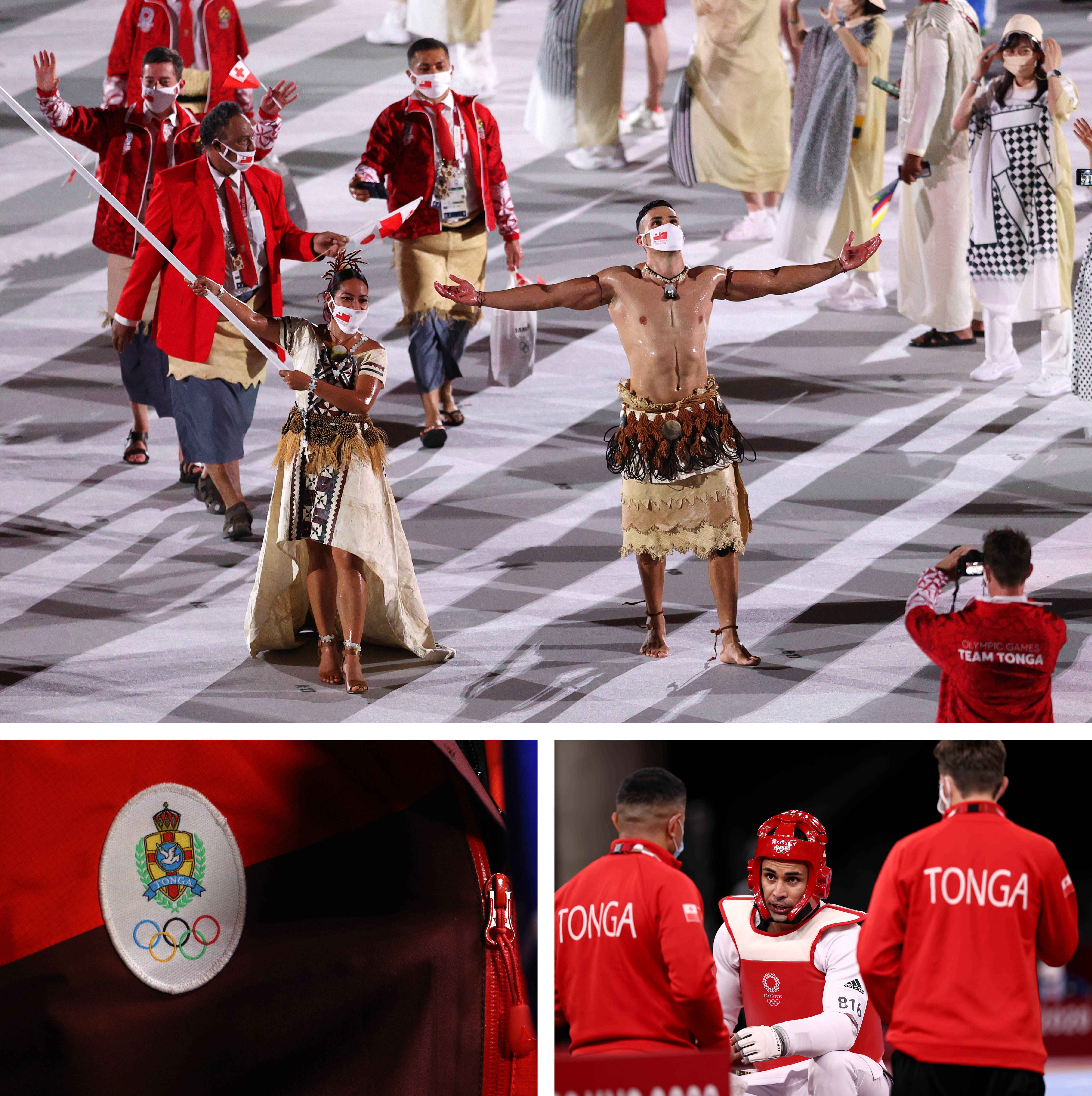
And it seemed that some young Tongans shared this view and acted accordingly. Some of the Tongan Olympians who competed in Tokyo this summer trained in China, all expenses-paid by Beijing. Chinese coaches followed them back to the islands for further training. Tongan athletes were the test case for this Olympics project, but Beijing treated other Pacific islander Olympians to the same largess.
In 2016, I knew of a teenager who came from a prominent Tongan family—her grandfather was a diplomat in London and her older relatives were educated in the U.K. and lived in the U.S., Australia and New Zealand—who decided she wanted to go to China for university. One Tongan teenager looking to China instead of the West is just an anecdote. But by the time Covid-19 broke out, there were about 160 Tongan students in China, half of whom were on scholarship.
China also enmeshed itself in Tonga’s merchant trade, starting in the ‘90s first with shops and then import-export, and then even farming – the traditional core of the Tongan way of life.
Some emigres also get into the black market, which spans everything from illegal harvesting of protected sea cucumber (prized in China) and sandalwood trees to drugs. Lots of drugs. A decade ago, authorities used to nab South American yachts stuffed with cocaine, lolling outside Tonga’s harbors on their way to Australia or New Zealand. By 2016 meth flowed freely in Tongatapu’s own streets, unsettling everyone. Corruptible politicians and jobless youth and deportees are in on it, but Chinese-Tongans were too.
And the Chinese, living separately as they do, almost live outside the law. The New Zealand police force, one of the pillars of the Western allies’ Pacific system, doesn’t penetrate them. I heard credible stories about Chinese mafia knifing each other without anyone noticing that a person was missing. Corruption is an important part of the story, says Jonathan Pryke, a China-Pacific expert at the Lowy Institute, an Australian strategic think tank. If the heart of a state festers, the society will lapse too.
Lost in the push-pull of East and West is what Tongans want. One Tongan friend phrased it as watching “two exes fighting.” Tiny countries don’t get much say in the face of empire, so in the clash of Beijing versus U.S. allies maybe there’s room for some leverage for once in a “multi-polar” world.
“Tonga’s engagement isn’t closed to a certain party,” Fatafehi Fakafānua, a prominent Tongan noble and speaker of Tonga’s legislative assembly, said in a recent Chatham House podcast interview with Paskal. “At the end of the day, Tonga needs to think of what is most beneficial for Tonga but at the same time be a global player.”
The West wants to know Beijing’s aims in the Pacific. However, my friend recently asked me, shouldn’t the West also be clear about what it wants?
The Kingdom’s nearest neighbors, Australia and New Zealand, anchor the traditional Western hegemony in the Pacific. They guard the nearby islands jealously and they don’t think they’ve “lost” any of them, including Tonga.
But even the Western allies don’t seem to see eye-to-eye on China. Beijing has driven obvious wedges right through the West’s post-World War II spy network, the alliance known as the “Five Eyes” of Australia, New Zealand, the U.K., the U.S. and Canada.
Just this year, Beijing hit Australia with tariffs for daring to criticize its brutal treatment of Muslim Uighurs. New Zealand, whose leaders have been far more timid, is starting to speak up too, but it’s harder for them. That tiny country has entwined itself ever closer to China through trade—even looking to join the Belt and Road initiative like 70 other nations.
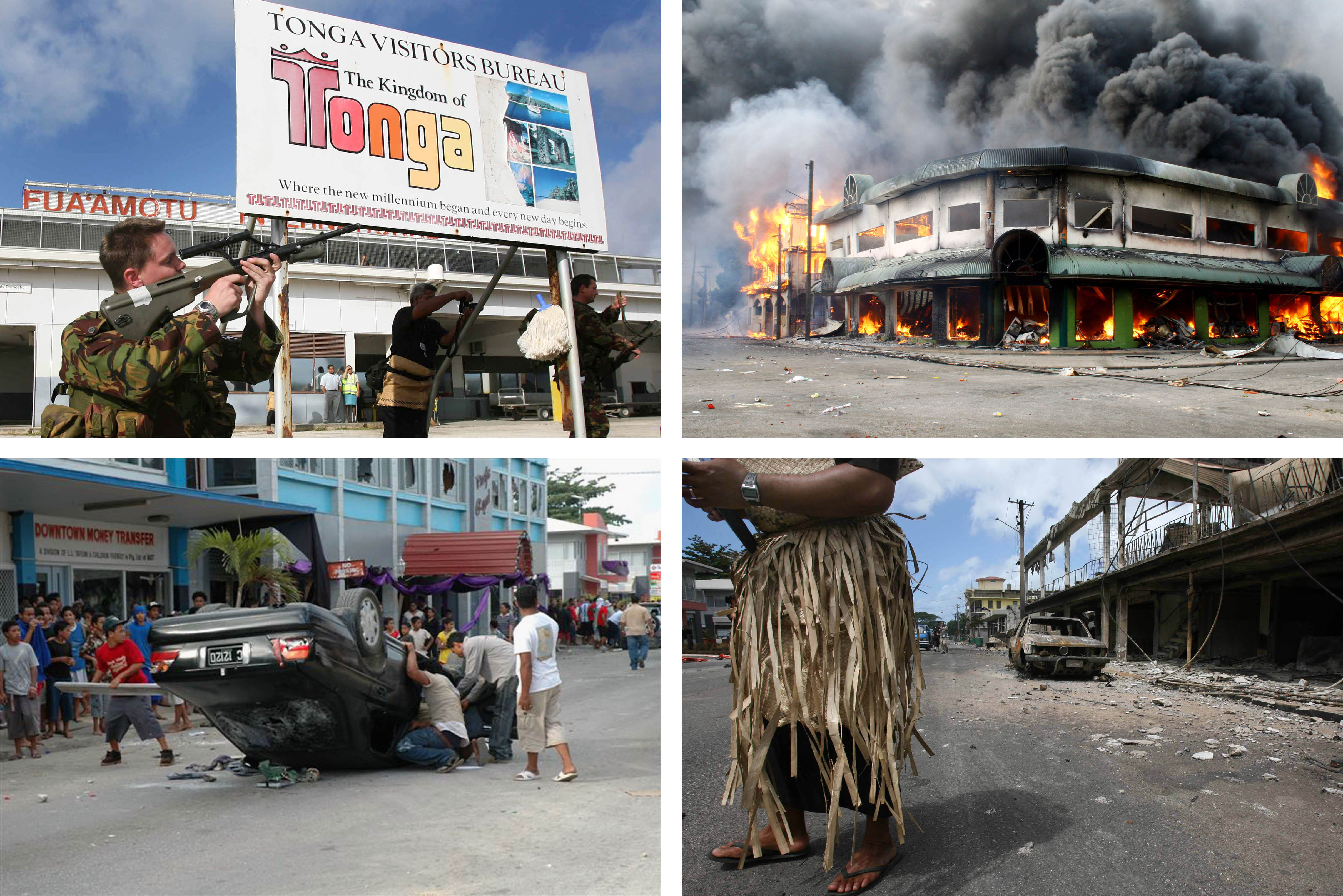
China is likely too distant and too different to have the same relations with Tonga or any Pacific island that New Zealand and Australia do. Every Tongan has close kin in one of those countries, or in the U.S. Tongans with money attend prep school in New Zealand, university in Australia. They share a passion for rugby. And when Covid-19 came along and sealed off the Pacific from the rest of the globe, they’ve seemed more tightly knit than ever.
But these neighbors mess up. In 2006, neither New Zealand nor Australia stepped up with cash when Tongan rioters burned down Nuku’alofa in pro-democracy demonstrations that also targeted Chinese-owned businesses. It was Beijing that stepped up instead, making a loan that currently stands at about $108 million. Then the Chinese government sent in workers to rebuild the town.
It’s debt diplomacy, Western observers groan. The loans will come back to bite Tonga, they predict, when Beijing wants to take control of something. Back in 2006, however, the gesture looked especially generous after the rioters targeted the businesses of Chinese immigrants who’d been pouring in since the ’80s. They’d moved into Tonga thanks to a passport-selling scheme that the world’s then heaviest monarch, King George IV, dreamed up to fill the treasury. The king raked in millions of dollars, a significant portion of the Kingdom’s GDP, and also a lot more people. By 2006 there were about 3,000 Chinese living in Tonga. Most of them left after the riots, but that didn’t last long. There are about 4,000 Chinese-Tongans now.
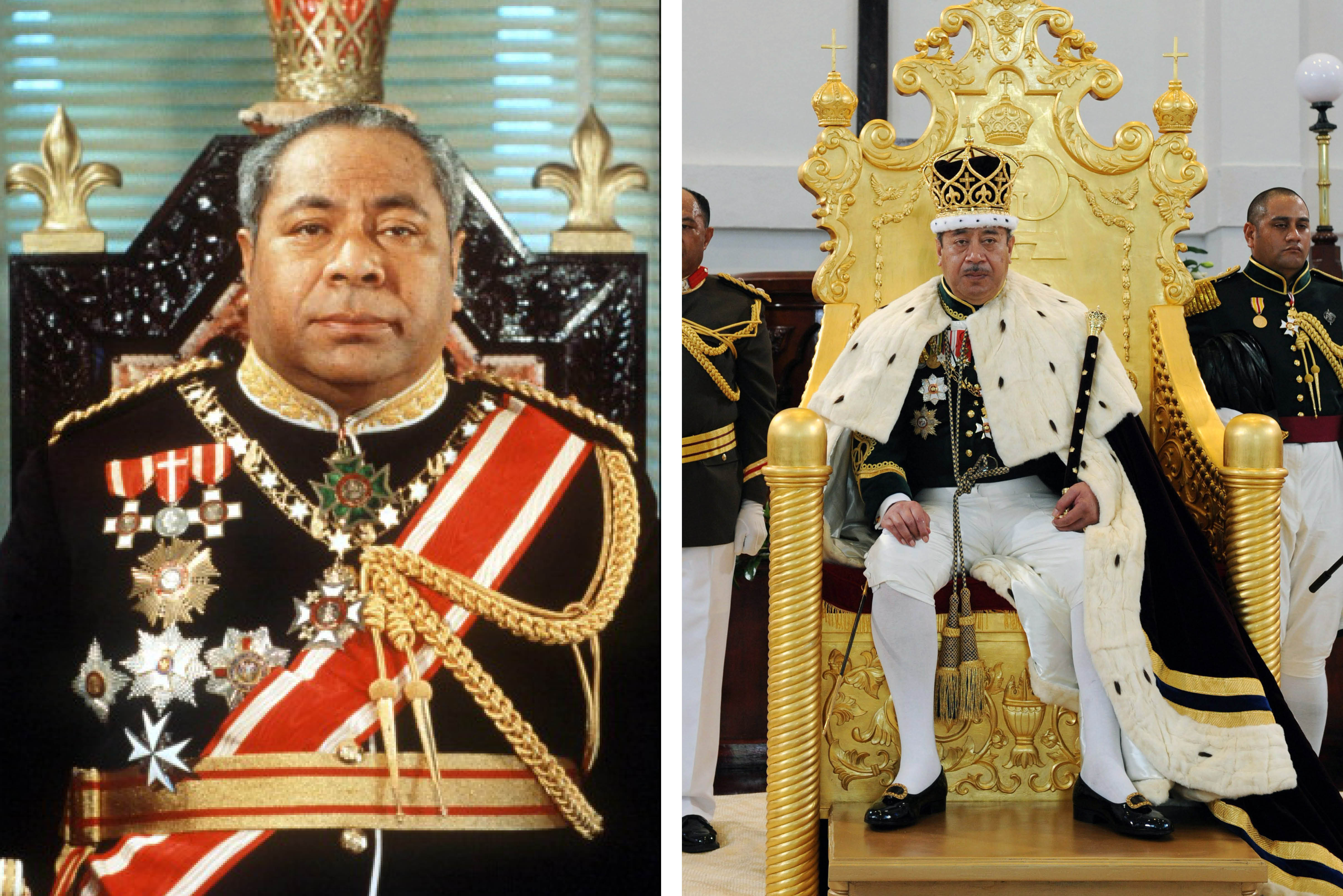
And now Tonga can’t quit China.
By the time Western allies started to notice what was happening, they were losing. Power follows money, and Beijing has been happy to supply Tonga’s leaders with whatever they need to keep their seats. China is playing the democratic system that Tonga’s late King George V established under pressure from the West. The first democratic prime minister, who had spearheaded Tonga’s push for democracy with New Zealand’s backing, spent years cozying up to Beijing before he died in 2019. His successor is now doing the same. Democratic elections reward politicians who can bring in the cash and Beijing knows this.
Beijing also doesn’t do the funding tease that the West does. They don’t promise cash only if the people will change their ways. The Chinese government doesn’t impose smoking bans and seatbelt laws and gender equality initiatives.
“The Chinese will show up with the money and say, ‘Do you need a palace?’” said Tevita Motulalo, a Tongan journalist and geopolitical strategist at the Royal Oceania Institute in Tonga.
“On the other hand with Australia or New Zealand, it’s very condescending, and borderline racist. They’ll push social reforms and not the practical challenges really facing people’s lives. It’s almost like they want to teach us how to be civilized and how to be Tongans, as if we just [popped up] yesterday and we don’t know how to deal with each other, and they need to tell us how to do this.”
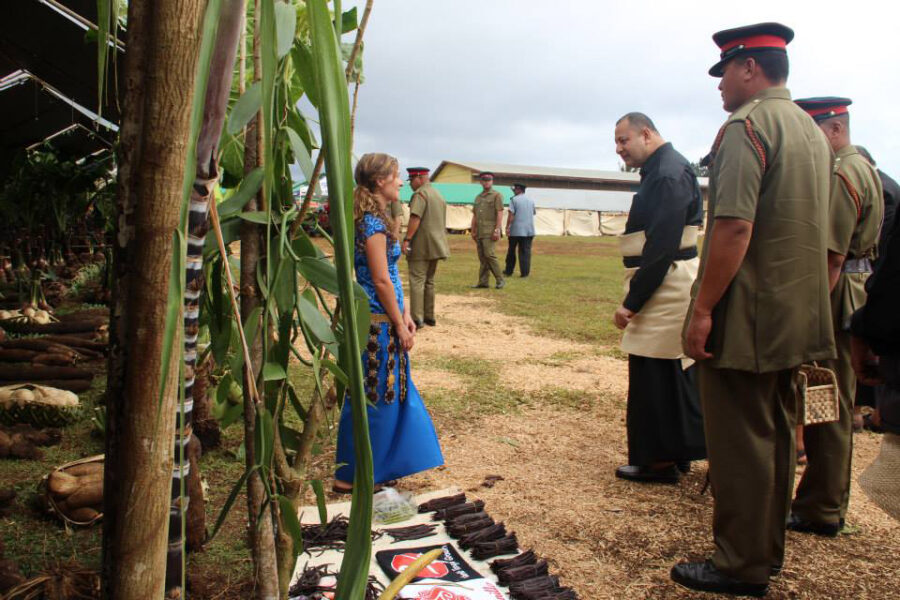
One of the Kingdom’s famous pro-democracy figures named Kalafi Moala told me that Tonga needs to develop its own independent relationship with China, and not let herself be forced to take the same view as the West or the United States.
Moala started the Kingdom’s first independent newspaper in the 1990s and went to jail for his pro-democracy writings. Chinese party propaganda is all over the Tongan newspapers these days, and I’d read up on some squabbles between Tonga’s former ambassador to China and another journalist over whether Tongan reporters should even criticize Beijing at all in print. I figured he might have some strong opinions about that.
But he was careful, echoing sentiments I’ve heard from some other Tongans about just wanting to stay out of the clash.
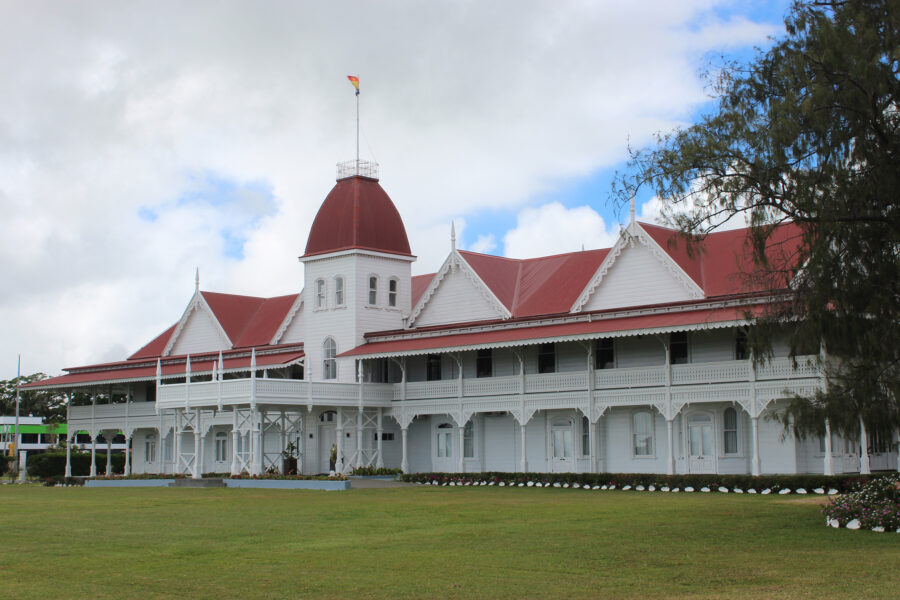
“The power struggles between superpowers should not be an issue that should sway us one way or the other,” he wrote back.
I’ve crawled the newspapers and government missives, and peppered various people in Tonga with emails and messages trying to figure what the leaders think. The sense I have is one I started to feel when I lived there, that their own views are shifting from West to East. India is beginning to emerge as another power center in what New Zealand and the U.S. have started to call the Indo-Pacific region recently.
All that said, China has the upper hand.
First there’s Tonga’s debt to Beijing, now equaling two-thirds of the Kingdom’s entire obligation to foreign countries. No one knows what China will demand in return, or when, but few doubt that it will demand something.
There’s political heft, flexing in the shape of St. George’s Palace, Nuku’alofa’s mysterious new penumbra of politicians. There’s the Chinese ambassador who faithfully attends every islander committee meeting, however trivial, however irrelevant to foreign powers, and always takes copious notes. The donations keep coming: water tanks and houses, a convention center and a new high school, fishing boats and tractors.
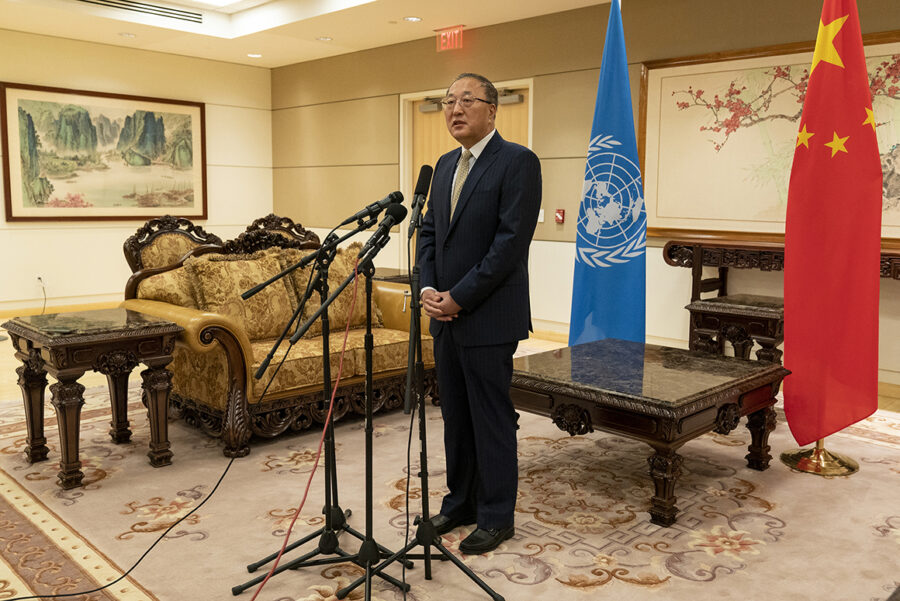
China also likes to tell its side of the breakup story with the U.S. in local newspapers and blasts from the Tongan embassy website. You can read up on American politicians’ “lies” about China regarding the oppression of the Uighurs or Covid-19 or America’s own alleged violations of international law.
Last year, after the Kingdom lost its U.N. vote over its unpaid dues, China’s ambassador said that Beijing spoke for the Kingdom “and other developing countries” at the U.N. Security Council—“with a view to safeguarding our common interests.”
Meanwhile, Beijing has just opened a consulate in Tonga as part of its embassy to make life easier for its own 4,000 citizens who live there. And China’s ambassador has signed over more than $24 million in Tongan currency for more building. The scuttlebutt is that maybe the money will fund a new bridge to connect the remote east side of the main island, where some of the best farms sit in sleepy villages, to the port in the capital. It would save farmers an hour’s drive. It would be built, no doubt, by blue jump-suited men from afar.
As Motulalo of the Royal Oceania Institute says: “It’s not clear what the government is giving away.”
Go To Source
Author: POLITICO

